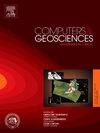The GEMMA (Geo-EnvironMental multivariate analysis) toolbox: A user-friendly software for multivariate analysis
IF 4.4
2区 地球科学
Q1 COMPUTER SCIENCE, INTERDISCIPLINARY APPLICATIONS
引用次数: 0
Abstract
Understanding the complex past and present environmental systems requires methodologies capable of analyzing large multi-parameter datasets. The intricate interrelationships within these heterogeneous data would not be effectively detectable using simply bivariate approaches (single parameters versus time/sequence) data series. The mono- or bivariate approaches often fall short, leading to over/underestimation of processes simultaneously affecting the environment. The Geo-EnvironMental Multivariate Analysis (GEMMA) toolbox addresses these challenges, offering a user-friendly software for multiparametric analyses of large and diverse datasets. In the context of increasing dataset complexity, the GEMMA toolbox employs advanced multivariate statistical methods to transcend traditional univariate analyses. It moves beyond compartmentalizing environmental systems, allowing for the analysis of diverse interrelations by setting an efficiency balance between simplicity and comprehensiveness. The GEMMA toolbox uses the programming language R and features a graphical user interface (GUI) to provide a user-friendly tool without requiring advanced programming skills. It allows to perform collinearity analysis (COA), cluster analysis (CLA), principal component analysis (PCA), detrended correspondence analysis (DCA), redundancy analysis (RDA), and integrates statistical analysis with time series (also from geological stratigraphic succession). At every step, the PCA, the DCA, and the RDA analysis are validated through Monte Carlo permutation tests, and results are automatically exported. Source-code is freely available (https://github.com/NewGeoProjects/GEMMA_Toolbox) to allow advanced R users to custom and further develop the software according to the open-source principles (https://opensource.com/open-source-way). Two case studies illustrate the flexibility and efficiency of this software in investigating datasets that differ greatly in data source and research purpose. The first explores the Miocene-Pliocene transition that occurred ∼5.33 million years ago in the Mediterranean Sea, tracking the environmental change at the end of the Messinian salinity crisis through alkenones molecular fossils record. The second case study investigates landslides induced by intense rainfall in north-western Italy, aiming to explore the impact of morphometric and lithological factors on landslide susceptibility.
The GEMMA toolbox is software designed to perform advanced multivariate statistical analyses on environmental datasets. It integrates data analysis algorithms, statistical validations methods, and dynamic workflow procedures into an easy-to-use GUI, proving GEMMA toolbox as an effective and flexible software solution for research.

GEMMA(地理环境多变量分析)工具箱:一个用户友好的多变量分析软件
理解复杂的过去和现在的环境系统需要能够分析大型多参数数据集的方法。使用简单的双变量方法(单参数与时间/序列)数据序列无法有效地检测到这些异构数据中复杂的相互关系。单变量或双变量方法往往不足,导致对同时影响环境的过程的高估/低估。地理环境多变量分析(GEMMA)工具箱解决了这些挑战,为大型和多样化数据集的多参数分析提供了一个用户友好的软件。在增加数据集复杂性的背景下,GEMMA工具箱采用先进的多元统计方法来超越传统的单变量分析。它超越了对环境系统的划分,允许通过在简单性和全面性之间建立效率平衡来分析各种相互关系。GEMMA工具箱使用编程语言R,并具有图形用户界面(GUI),无需高级编程技能即可提供用户友好的工具。它允许执行共线性分析(COA)、聚类分析(CLA)、主成分分析(PCA)、去趋势对应分析(DCA)、冗余分析(RDA),并将统计分析与时间序列(也来自地质地层演替)相结合。在每个步骤中,通过蒙特卡罗排列测试验证PCA、DCA和RDA分析,并自动导出结果。源代码是免费提供的(https://github.com/NewGeoProjects/GEMMA_Toolbox),允许高级R用户根据开源原则定制和进一步开发软件(https://opensource.com/open-source-way)。两个案例研究说明了该软件在调查数据源和研究目的差异很大的数据集时的灵活性和效率。第一个探索发生在~ 533万年前的地中海中新世-上新世过渡时期,通过烯酮分子化石记录追踪墨西尼亚盐危机末期的环境变化。第二个案例研究调查了意大利西北部强降雨引发的滑坡,旨在探讨地形和岩性因素对滑坡易感性的影响。GEMMA工具箱是一种软件,旨在对环境数据集进行先进的多元统计分析。它将数据分析算法、统计验证方法和动态工作流程序集成到一个易于使用的GUI中,证明了GEMMA工具箱是一个有效而灵活的研究软件解决方案。
本文章由计算机程序翻译,如有差异,请以英文原文为准。
求助全文
约1分钟内获得全文
求助全文
来源期刊

Computers & Geosciences
地学-地球科学综合
CiteScore
9.30
自引率
6.80%
发文量
164
审稿时长
3.4 months
期刊介绍:
Computers & Geosciences publishes high impact, original research at the interface between Computer Sciences and Geosciences. Publications should apply modern computer science paradigms, whether computational or informatics-based, to address problems in the geosciences.
 求助内容:
求助内容: 应助结果提醒方式:
应助结果提醒方式:


